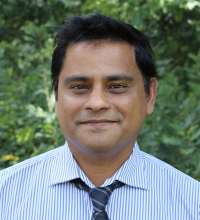With growing demand for farmed fish as a more sustainable source of protein for the planet, there is increasing attention on the sustainability of feed used in aquaculture production. Current aquaculture feeds are over-reliant on ocean-derived fishmeal and fish oil rendered from forage fish. Research suggests that at current rates, demand for aquaculture feeds could outstrip supply of forage fish by 2037. In addition, there is a growing need for fishmeal and fish oil from other industries.
In this project, researchers developed a new protein meal. The team successfully extruded under-utilized microalgal co-products that are left over from oil extraction in existing facilities and found that these extruded by-products have higher nutritive values than the comparable raw form. The team's new aquafeed formula combines these co-products with another oil-rich microalga, fully replacing fishmeal and fish oil for rainbow trout feeds. Digestibility trials suggest that the extruded co-product is more digestible for the trout than the co-product in its raw form, and rainbow trout fed the fish-free, microalgae diet had growth and survival rates as control fish, fed conventional diets. Feed cost per kilogram of trout were comparable, too, suggesting the economic feasibility of this diet.
This project should improve the sustainability of trout production; the new feed formula can directly contribute to more environmentally-sound diets and economically sustainable use of under-utilized resources. It will directly benefit aquaculture operations, public hatcheries, microalgae operations and feed mills.
 Pallab Sarker
Pallab Sarker